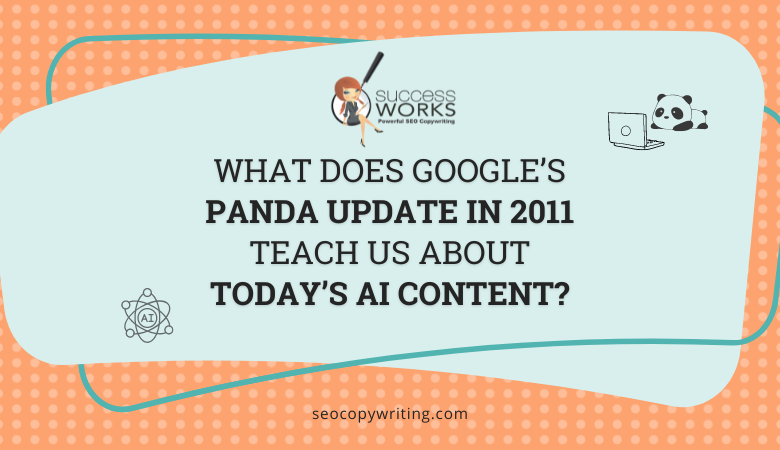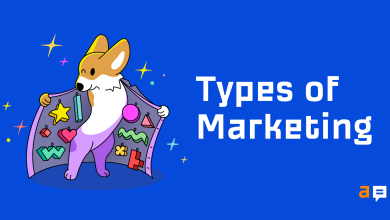What Does Google’s Panda Update in 2011 Teach Us About Today’s AI Content? – SuccessWorks-SEO

Twelve years ago, the SEO world was officially rocked by a … Panda.
No, not the cuddly black-and-white creature. On February 23, 2011, Google’s Panda algorithm update rolled out.
And everything changed like that. ::snapping fingers::
Back in 2011, Google was a different place. Seeing low-quality content positioning was common. Experienced SEO writers were competing against “content spinners,” who would write one article for a low monthly fee, swap out the keywords, and create nine more.
An article about “the best tennis shoes for women” turned into an article about “the best tennis shoes for men” and “the best tennis shoes for kids.”
Same article, different keywords.
Some businesses thought content spinning was the answer to their content prayers, and they’d never have to pay a “real” writer ever again.
(Sound familiar?)
Here’s how Google’s Panda update changed everything
As you can imagine, people hated searching through crap Google results to find answers to their search queries.
Google didn’t like this situation either. After all, who wants to use a search engine (and click on its money-making ads) if the results are crap?
So, Google changed the game with one algorithmic update. Suddenly, low-value content that used to position was nowhere to be found.
I know business owners who closed shop because of the Panda update. One day, their site had great positions and drove tons of traffic…
The next day, their positions disappeared, and business dried up.
Ouch.
SEO writers post-Panda update felt vindicated. Google DID want quality content. Our skills DID matter. Companies were hiring content writers again.
Fast-forward to today and people’s (understandable) fear about AI content flooding Google’s index.
At least once a day, a writer asks me if their job is safe and if SEO is here to stay. Their question always flashes me back to those Panda days.
What I say is…
SEO (and SEO writing) isn’t dead yet.
Here are two reasons why:
First, Google has already shown that it doesn’t want a bunch of low-quality content positioning in the top ten results. Companies won’t be able to generate twenty articles a day via ChatGPT and see that content automatically position.
A flesh-and-blood writer (like you) would need to review the content for accuracy, add additional content AI didn’t include, and provide an emotional hook (because AI, like some of my exes, doesn’t do emotional well.)
Depending on the competitiveness of the search query, you’d probably have to spend significant time on an AI-produced article to make it “stand out” enough for Google.
It would be like editing an article created by an intern. The bones may be there, but the article wouldn’t be ready for prime time.
The second reason is that Google’s Search Quality Rater Guidelines now mentions “experience” as part of the E-E-A-T guidelines (Expertise, Experience, Authority, and Trust.)
Here’s more information about Google’s Rater Guidelines. High-quality content has good E-E-A-T.
Our ChatGPT overlords can’t experience a SaaS product and write a review. Nor can it provide a technical insider quote clarifying a confusing concept.
ChatGPT is good at parroting back other people’s previous writing. It’s not good at creating thought-leadership (or technical) content that requires a human touch.
Will writers need to know ChatGPT prompts? Sure. But they’ll also need to understand how to write copy and run competitive intelligence the old-fashioned way.
The SEO writing world has seen these types of shakeups and corrections before. AI may change our content writing process, but it won’t replace all writers.
Just the writers who let the robots take their jobs.
So, you can relax if you’re freaking out thinking Google’s search results page will get flooded by low-quality, AI-produced content.
Google has been here before. We’ve been here before.
And Google is pushing for content quality even more than it did back in the day.
The more things change, the more things stay the same.
As I was about to send this to my editor, this article about SEO being alive and kicking in 2023 — and beyond — hit my feed. Yup, I’m not the only one who thinks SEO is safe.
What do you think?
How has your content strategy changed now that AI content is more mainstream? Are you sharpening your skills? Or are you freaking out? Leave a comment and let me know.
#Googles #Panda #Update #Teach #Todays #Content #SuccessWorks





